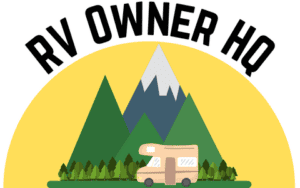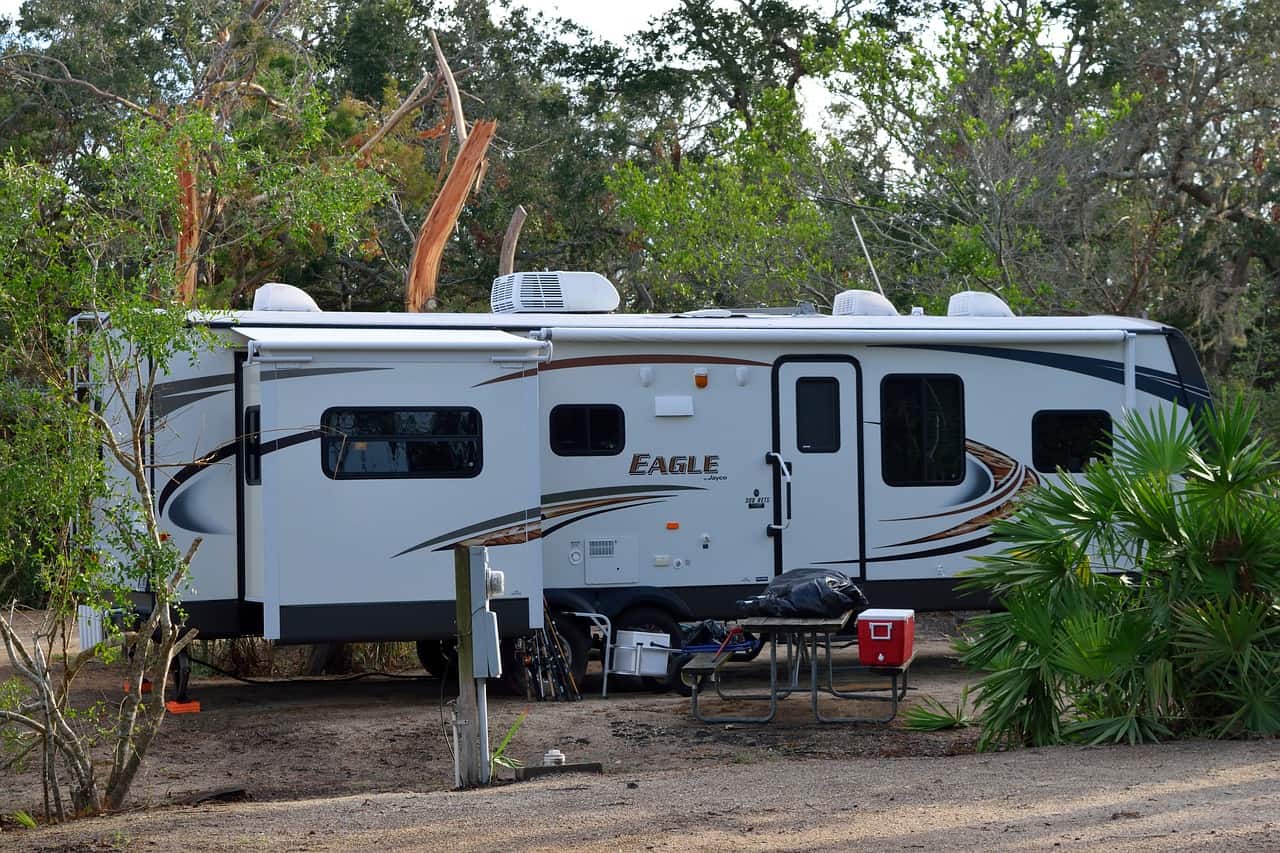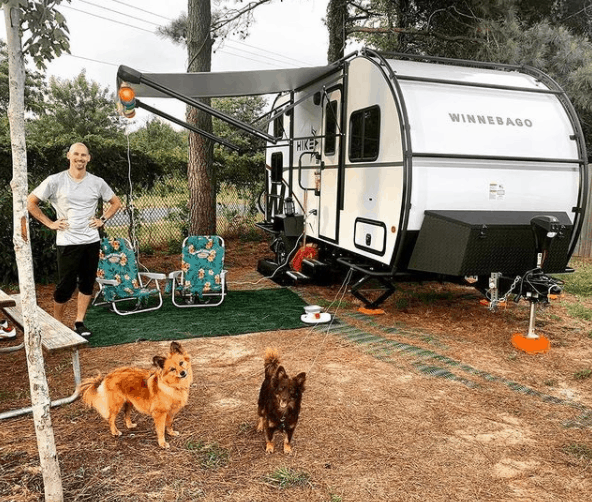If you’re new to the RV lifestyle and RV parks you might be wondering how safe RV parks are?
So we thought we would break down how safe RV parks are as well as discuss some things you can do while staying at RV parks to help keep you and your family safe.
In general RV parks are safe but that doesn’t mean crime doesn’t exist or happen. Because while the vast majority of people staying in RV campgrounds are honest law-abiding citizens there will always be a small percentage of people that are not. So it’s important to be proactive about your safety and security while staying in an RV park by being vigilant and not letting your guard down.
There is a lot more to know about RV park safety though including specific things you can do to help keep you stay safe while staying in campgrounds and RV parks.
So keep reading as we break down everything you need to know about RV parks and campground safety.
Crimes Committed at Campgrounds
In order to get a better idea of the type of crimes committed in campgrounds and RV parks, let’s take a look at some of the most common types of crimes committed in campgrounds according to the National Park Service Investigative Branch.
| Type of Crime | Percentage of Total Crime Committed | Examples of Crime Type |
| Crimes Against Persons | 57% | Aggravated Assult, Kidnapping |
| Property Crime | 19% | Arson, Burglary, Breaking & Entering |
| Crime Against Society | 10% | Animal Cruelty, Prostitution |
| Natural Resource Crimes | 6% | Illegal Dumping, Water Source Contamination |
| Drug Crimes | 3% | Drug Trafficking, Drug Manufacturing |
| Cultural Resource Crimes | 3% | Damage or Defacing Historical Sites |
I don’t know about you but when I saw that 57% of crimes committed in campgrounds were crimes against persons which include things like assault, kidnapping, and even murder I was alarmed.
But it’s important to keep these things in perspective and remember that in general, you are not any more likely to be a victim of crime in an RV park than you are in your normal everyday life.
I mean think about your local news which spends about half of their broadcast or more talking about all the recent crimes in your local area.
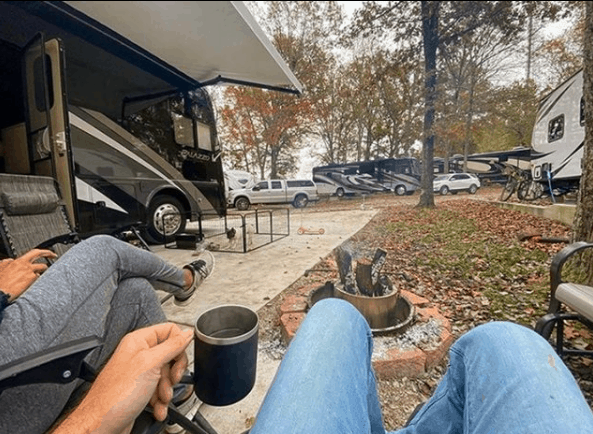
Are RV Campgrounds Safe? How RV Camping Has Changed
While crime has always existed in RV parks and campgrounds.
In the past crime was a rarity because of the type of people staying in campgrounds, which were usually just RV travelers on vacation staying a few nights before they moved on to their next destination.
However, in recent years due to the housing affordability crisis, more and more RV campgrounds are being filled with full-time residents that often can’t afford more traditional housing such as a house or an apartment.
Turning what used to be an RV campground filled with fun and leisure, into what more closely resembles a trailer park that can often attract undesirables and crime that goes along with it.
And because of this demographic change in many RV campgrounds, especially low-end or cheap RV campgrounds, safety can be a real concern.
So how are you supposed to stay safe while RVing and staying in RV campgrounds?
Well luckily for you we have compiled the 7 best tips to help you stay safe while RVing and staying in RV parks and campgrounds.
Top 7 Tips to Stay Safe While Camping at an RV Campground
While nothing you do will guarantee your safety while staying in an RV campground, there are many things you can do to be proactive about your safety and to help keep you safe while camping in an RV park.
Do Your Research and Plan Ahead
Your first line of defense for staying safe in an RV park or campground is to do your research and plan ahead before you ever show up to the campground in the first place.
This will help you to avoid many of the bad and unsafe campgrounds altogether while RVing.
There are many ways to do research on RV campground safety but the best ways are to check independent user reviews of the campground as well as check out Google street view of the area to get a better feel for the area the RV park is located in.
Our two favorite websites for independent RV campground reviews are:
Another place to check to get a better feel for the RV park’s safety is the campgrounds website and Facebook page.
Look to see if the website has a professional design and feel which is usually a good indicator of how professional the campground is run. Also, look for any photos of the campground on their website and Facebook page to get a better feel for the campground.
While it’s true the pictures the campground puts on their website will usually put the RV campground in the most favorable light, you can still get a pretty good idea of what the campground is like from the photos.
Pro Tip – If the RV park or campground you’re planning on staying at doesn’t have a website or a Facebook page this is usually a big red flag and warning sign as almost every RV campground has a website and a Facebook page these days.
And if they don’t this usually means it’s a good place to skip if you’re concerned about safety.
Use Your Intuition and Fight or Flight Response
Your next best line of defense when it comes to safety while RVing and at RV parks is your own intuition and fight or flight response.
As humans, we have built-in alarm bells such as intuition and fight or flight responses that have developed over hundreds of thousands of years to help us survive.
So if something doesn’t look right or feel right at an RV park, don’t ignore these feelings or blow them off thinking you’re just being paranoid.
Instead, use these feelings to take action to keep you and your family safe while RVing and camping at RV campgrounds.
Don’t Camp Alone or Give the Appearance You Are
There is always safety in numbers and when RVing or RV camping this is just as true as ever.
So if you plan to travel in an RV or stay in an RV park or campground make it a group activity whenever possible, as this will help you stay safe no matter what situations might come up.
And if you’re someone that enjoys the solo road while RVing at least make sure you’re not advertising the fact that you’re camping alone.
You might also consider putting multiple pairs of shoes or boots in front of your trailer or putting out more than one lawn chair to give the appearance that a group of people is staying at the campsite.
Also, a couple of furry friends like a dog or two make a great alarm system and deterrent for those that might mean you harm while camping in an RV park.
Get to Know Your Camp Host and Campground Staff
Getting to know your camp host and campground staff can also go a long way in helping you stay safe while camping at an RV park.
As they can be a wealth of information on things to be on the lookout for while camping in the campground and can also alert you to any issues they might be currently having at the RV park.
When camping at a campground it’s always best for you to put a face to your campsite and not just be another campsite number, as this can help the camp host and campground staff be more invested not only in your safety but also in making sure you have a great visit.
Know Who to Call in Case of an Emergency
Don’t wait until there is an emergency or issue before trying to and figure out who you need to call for help.
So make and keep a list of numbers close at hand you might need in case of emergency including but not limited to the camp host’s phone number, the campground’s office number, as well as the local police number.
Stay Flexible and Maintain Your Mobility
Often one of your best lines of defense, if you do run into trouble or danger while camping in an RV park, is to simply get away from the situation or danger by driving away.
However, this can be difficult if you’re in a 40-foot motor home with leveling blocks and jacks down and buried behind a mountain of bikes and other camping gear making your retreat to safety challenging and time-consuming.
So when possible try to maintain your mobility as best as possible when camping in an RV park or campground and stay as flexible as you can.
And at least make sure you have a clear and concise plan to pull up stakes and get on the move as efficiently and quickly as possible if you do run into trouble.
Secure Your Campsite and Lock Your RV
While this might seem obvious and a no-brainer, it’s surprising how often campers and RVers will leave their campsite without securing everything and locking their RV. And this is especially true if they are just going to be gone for a “few minutes”.
So whether you’re going to leave your campsite for several hours or just a few minutes, always lock your camper and secure everything that might be outside such as your generator, bikes, and camp furniture. To help prevent you from falling victim to campsite theft.
Are KOA Campgrounds Safe?
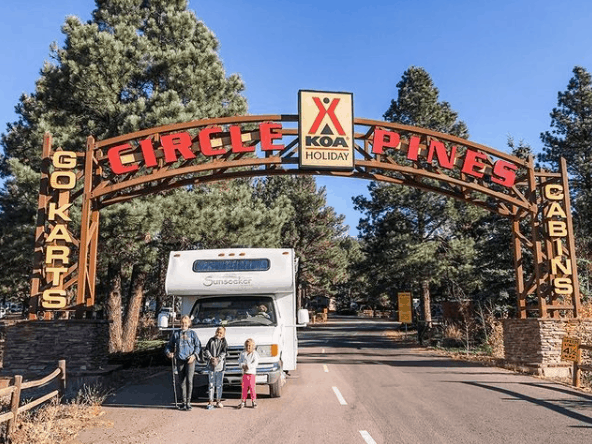
Campers usually love KOA campgrounds thanks to all their great amenities such as swimming pools, playgrounds, and great Wi-Fi but they also love KOA campgrounds because they are generally very safe campgrounds thanks to all their safety measures such as fenced perimeters, security gates, well-lit campground, cameras, and 24-hour security.
Every KOA campground does not have all these safety measures in place though, and even if they do crimes and incidents do still happen at KOA campgrounds as they are not immune to the dangers of society.
So while camping at a KOA campground it’s always a good idea to follow a few best practices to keep you and your family safe.
- Ask what security measures the KOA campground has in place, such as a 24-hour guard and or nightly patrols.
- Don’t be afraid to ask if they have had any recent security issues or incidents at the campground.
- Look to see how hard it is for non-KOA guests to come and go from the campground. As safety incidents can often come from people that are not actually guests of the campground.
- Choose a campsite towards the middle of the campground because campsites that are towards the middle are usually highly visible and the safest campsites in the park.
- Do your part to keep you and your family safe while staying at a KOA campground by being aware of your surroundings and keeping your RV and campsite secure both when you are there and when your away.
Are National Park Campgrounds Safe?
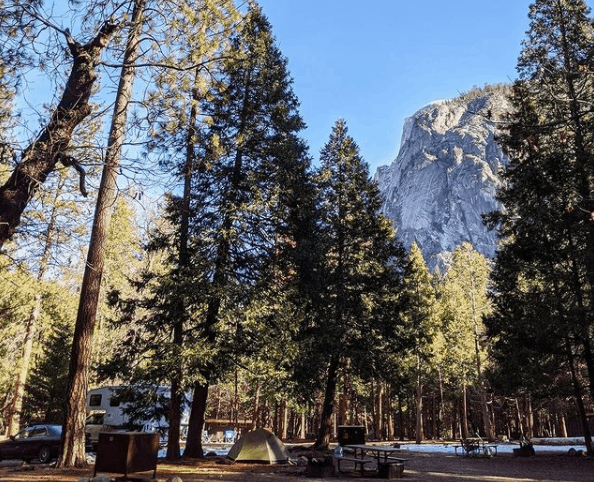
National Park campgrounds are generally safe and well cared for by park rangers and staff however while camping in a National Park campground it’s important to remember that you are ultimately responsible for your own safety while staying at a National Park campground.
It’s also important to remember that danger can take many forms when camping in a National Park due to the typical rugged nature of their campgrounds including environmental danger, personal danger, campfire danger, as well as wildlife danger.
So if you plan to camp in a National Park campground make sure you’re prepared to do so by having all the necessary camping gear and supplies you will need.
And while it’s unlikely, you should also have a general safety and emergency plan in place in case something were to happen while camping in a National Park campground.
For a list of amazing full-time RV parks, check out our article “Best RV Parks for Full Time Living: By State“.
Recent Posts
When cruising down the highway in your RV, the last thing you want is a tire blowout! Not only is it dangerous, but RV tire replacement isn't cheap, costing $200 to $300 per tire. The good news,...
Nothing ruins an RV adventure faster than a breakdown with no way to fix it. Because of this, every RVer should have a well-stocked RV tool kit for those unexpected roadside emergencies and campsite...
